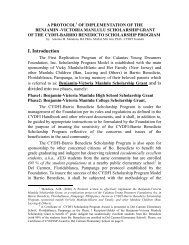CYDF Newsletter, Vol.2, Issue 1, 2007 August 2008 - Calantas ...
CYDF Newsletter, Vol.2, Issue 1, 2007 August 2008 - Calantas ...
CYDF Newsletter, Vol.2, Issue 1, 2007 August 2008 - Calantas ...
You also want an ePaper? Increase the reach of your titles
YUMPU automatically turns print PDFs into web optimized ePapers that Google loves.
Understanding Our Values, As Filipinos….P AGE 5The main source of this excerpt is based on the writings (Book One) of Tomas Andres, Ph.D., published in Book Seriesby Giraffe Books in the Philippines. Some of his writings are quoted and presented in the <strong>CYDF</strong>I <strong>Newsletter</strong> for sharingand learning purposes only. You may or may not agree with “him” but it is good to note that there is a scholar like himwho took the pain of researching all these materials for Filipinos in the Philippines and across the globe. It is the intentof the <strong>CYDF</strong>I Founder to continue sharing some of the writings of Dr. Andres on Filipino Values. ….Tony MendozaSome Positive Cultural Values…♦ Positive Cultural Values Relating to Religion1. “Maka-Diyos” Culture. This is still string in the country as a whole, being 85% Roman Catholic. The belief in God is astrong positive value because it places value on what is moral and ethical, in personal relationships. Unfortunately,however, such value does not extend to business or financial transactions. In a way, Filipinos in general, differentiatebetween what is business and what is personal. They are moral and ethical in personal relationships but not in businesstransactions. As it is aptly put, “nothing personal, purely business” (“walang personalan, trabaho lang ito’).♦ Positive Cultural Values Relating to Society1. Strong National Pride. The more highly educated and more affluent are generally proud of what they are. This sense ofpride is a strong cultural value because it can be harnessed during times of emergency as in the 1986 EDSA Revolution.Unfortunately, oftentimes such feeling of pride is not translated into action, but remains lip service. They are proud of theirsocial circumstances, until they begin to affect their pocketbook.♦ Positive Cultural Values Relating to Family and Small Groups1. “Tayo-tayo” System. This is generally considered as a negative cultural value. It has, however, positive elements to it. Forinstance, this attitude develops trust and confidence among members of the group and enables them to venture harder.Group dynamics is made easier because of the close association and identification of the group members. This is positiveelement.2. “Pakikisama System.” This is similar to the above. It also has negative aspects but can be used positively. For instance,because of the system, the social atmosphere in the workplace is enhanced.♦ Positive Cultural Values Relating to Self1. “Bahala Na” Attitude. The more highly educated and affluent have in common with the rest of the Filipinos and believein pre-ordained destiny or fate. Whatever will be, will be. This is partly positive and partly negative. It is positive becauseit engenders the entrepreneurial spirit, but negative if it justifies lack of preparation.2. High Premium on Education. This value is definitely positive because it has resulted in producing what is probablythe most literate region in this part of the world. In addition, we are one of the highest density of colleges and universitiesin the world located in the Metropolitan Manila.Positive and Negative Aspects of Some Values…♦ Fondness for Fiestas (for Patron Saints)1. Positive It is a display of reverence for Saints whose lives are worthy of inspiration and emulation; for religious andspiritual upliftment.2. Negative: It can be a cause for impoverishment. Families sometimes borrow money or even sell property just to be able tocelebrate.♦ Docility (over-submissiveness). This is very evident among the barrio folk. They don’t question order; they just obey.1. Positive: The society can be assured of a peaceful citizenry.2. Negative: Initiative is lost. Over-submissiveness can lead to dependency and parasitism.♦ Kahihiyan (pride, false pride?). A person wants to undertake something because it is the right thing to do, but hesitatesbecause it would be a source of embarrassment if he fails.♦ Keeping Up with the Joneses”. When people feel that they have to own or do whatever their neighbors have or do.1. Positive: One will strive to earn more.2. Negative: Priorities in budgeting family finances become topsy-turvy.♦ Respect for Elders. This is a positive value which enhances discipline and good manners. It promotes closer family ties.♦Clannishness. Even belonging to the same town or province can bring individuals closer to each other.1. Positive: It promotes bayanihan spirit. A common goal can be more easily accomplished.2. Negative: This can limit social life.











